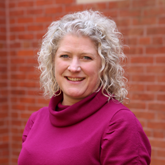
“The material we cover in class can be really difficult,” says Professor Jen Schweer. “There are so many things that can come up for students when talking about and processing this topic.” The content of her course, titled Relationship Violence & Sexual Assault: A US Perspective, is covered in weekly sessions of two and half hours, which some may view as a daunting time allotment devoted to intense discussion. But it’s her skilful integration of wellbeing topics and inclusive pedagogy into the course curriculum - a skill that she’s cultivated through several years as an Engelhard Faculty Fellow - that is meant to leave students hopeful and energized around this issue at the end of the course. Prof. Schweer is also a Campus Resource Professional (CRP). When she’s not teaching her own Engelhard course, she serves as a CRP where she facilitates sessions for other Engelhard courses where mental wellbeing topics are aligned with her area of expertise. Prof. Schweer says that a big part of ensuring the success of an Engelhard unit from the role of a CRP is working closely with professors in advance to learn about the culture of the course and how the CRP’s content and pedagogical strategies can be adjusted to fit within that culture. “It’s important to frame it in a way that connects with the class and course materials,” Professor Schweer says. “That happens through learning what kind of content, tools and techniques can support the goals of the course and while also introducing new information/materials to students.”
For Professor Schweer, there are multiple benefits of working with Engelhard in these distinct capacities: she not only gets to help create a safe, supportive, and transformative space for students as a professor of an Engelhard course, but she also reaps the benefits of being a part of an engaged community of Engelhard Faculty Fellows. Additionally, helping facilitate other Engelhard courses as a CRP allows her to connect her day to day work and expertise with content in the classroom, allowing students to see the real-world application of mental health and wellness topics in places they don’t necessarily expect . She says, “The benefits of it really do just keep coming, and not just for the students, but also for those of us who have the privilege of being a part of this innovative project.”
“I'm a huge fan of the Engelhard model and the wellness component in all ways, both as an instructor who integrates it into my course and also as a health professional who is invited into classroom communities to make real-word connections.”